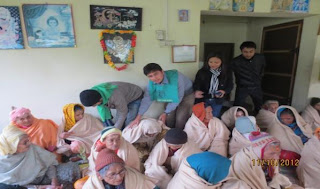 Young
people represent at least 18 per cent of the world’s population. In Nepal,
youth (15-40 years) constitute about 40 per cent of the population. These cohorts represent a critical constituency for shaping of nation's future and are the pioneers of socio-cultural, political and economic reform. They are the
crucial segments of nation’s development. While the lifestyles and
attitudes of young people today are out looked with negative stereotypes, many
youths in the country are actually the productive members of the society. The
majority of youths in this country also engage in some form of volunteer
activity, and many see the value of serving others. Youth volunteerism is
becoming one of the keys to address development challenges.
Young
people represent at least 18 per cent of the world’s population. In Nepal,
youth (15-40 years) constitute about 40 per cent of the population. These cohorts represent a critical constituency for shaping of nation's future and are the pioneers of socio-cultural, political and economic reform. They are the
crucial segments of nation’s development. While the lifestyles and
attitudes of young people today are out looked with negative stereotypes, many
youths in the country are actually the productive members of the society. The
majority of youths in this country also engage in some form of volunteer
activity, and many see the value of serving others. Youth volunteerism is
becoming one of the keys to address development challenges.
Through
greater involvement, youth volunteering facilitates access to work and
contributes to forming young leaders for today and tomorrow. Volunteerism serves
a valuable role in reaching special populations, such as orphans, children,
people with disabilities, and other vulnerable communities and groups.
When
youth get involved in volunteerism, benefits are reaped by almost everyone concerned-
the target groups (children, poor, disabled, etc.), the community and most
especially the involving youth themselves. Volunteerism has important
implications for positive youth development. It encourages a sense of service
and responsibility towards others, provides an avenue for developing skills and
relationships, and facilitates the development of various social and leadership
skills such as teamwork, communication, problem solving, project planning, time
and task management, and organization.
 Youth
volunteerism has several benefits. Through volunteerism, youths can make
services available to more people in the community, often helping the neediest
population and/or areas that require special attention (schools, orphanage,
old-age homes, etc.). In doing so, youths gain opportunities to learn new set
of skills and provides valuable work experience. As youths intermingle with
various organizations and people during volunteerism, it strengthens bonds to
the community and broadens their support network, exposing them to people with
common interests. Volunteerism provides many of the developmental assets of
youth. The experience of volunteerism can help develop many social
competencies. It helps in the realizations of one’s own leadership potentials,
confidence, self-esteem and above all his/her own ability to make a difference.
Youth
volunteerism has several benefits. Through volunteerism, youths can make
services available to more people in the community, often helping the neediest
population and/or areas that require special attention (schools, orphanage,
old-age homes, etc.). In doing so, youths gain opportunities to learn new set
of skills and provides valuable work experience. As youths intermingle with
various organizations and people during volunteerism, it strengthens bonds to
the community and broadens their support network, exposing them to people with
common interests. Volunteerism provides many of the developmental assets of
youth. The experience of volunteerism can help develop many social
competencies. It helps in the realizations of one’s own leadership potentials,
confidence, self-esteem and above all his/her own ability to make a difference.
UN
Secretary, Ban Ki Moon stated, “Youth are a
transformative force; they are creative, resourceful and enthusiastic agents of
change, be it in public squares or cyberspace. From their pivotal role in
efforts to achieve freedom, democracy and equality, youth have energetically
demonstrated yet again their capacity and desire to turn the tide of history
and tackle global challenges.”
Photo Courtesy: Rotaract Club of Kathmandu Mid-Town


good job dai.....best of luck for your ur website
ReplyDelete